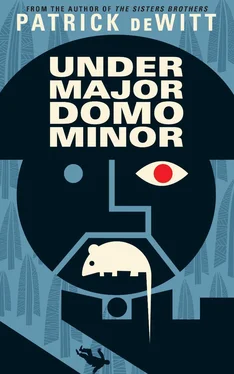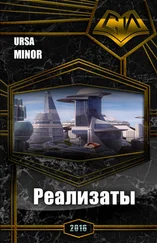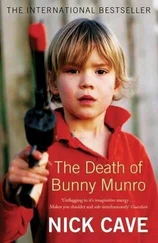“I believe it will not, sir.”
“Do you wish to maintain your position here?”
“You know full well that I do.”
“Then what is there to speak of, after all?” With this, Mr Olderglough stepped to the window to survey the world. “Now, where has that sly old sun gone to, eh?” In searching it out, he leaned too close to the window, and knocked his forehead lightly upon the pane of glass.
All this to say, Lucy did take to bed that night, and the door was left open, and Mr Olderglough did hide away with a birch club gripped in his hand and a look of dogged resolve stamped upon his face. He had told Lucy they were not to speak, and so they did not. At one point Rose crept across the room to sniff and nip at Mr Olderglough’s foot; Lucy collected her and fetched her back to his bed, rubbing her bare belly, which made her restful, and soon she slept, ignorant to the woes of her master.
Lucy’s dread was consistently dire. Time and again he thought he heard the shuffling approach of the Baron, and yet the doorway remained vacant, and Lucy could only gaze into the bottomless darkness and wonder at what it held. An agonizing hour crept by, and then a half-hour, and now he became aware of an unfortunate fact, which was that Mr Olderglough was sleeping standing up, this made apparent by the man’s gentle, wheezing snore. Lucy had thrown off his blanket that he might cross the room to awaken him when he saw the Baron hunched at the top of the stairwell, completely naked, bathed in grime, panting, and staring at Lucy with a puzzled derangement.
Lucy said, “Mr Olderglough, sir.”
The Baron stepped sideways into the room.
“Mr Olderglough.”
The Baron moved ever closer to Lucy.
“Mr Olderglough!”
Mr Olderglough snuffled, and the Baron, hearing this, peered over his shoulder at the door. Stepping nearer, he drew the door back, and there stood Mr Olderglough, leaning against the wall, arms slack at his sides, mouth agape, dozing babe-like. The Baron studied him for a time, as though in distant recognition; reaching up, he lay a hand on Mr Olderglough’s cheek. At this, Mr Olderglough awoke, and upon seeing the Baron before him he let out a brief yet sincere shriek, raised the club high, and brought it down over the Baron’s skull. The Baron dropped where he stood and lay motionless on the floor.
Mr Olderglough was studying the birch wood admiringly. “Do you know, I enjoyed that,” he conceded, and his face bespoke an exhilaration, for how curious life was, how unfathomably novel, and occasionally, wonderful. Mr Olderglough moved to lay the Baron prone on his back. Taking up the man’s filthy wrists in his hands, he said to Lucy, “Get his feet, boy, will you?”
Shortly after he was tied to his bed the Baron came to, and upon registering the fact of his apprehension, then did he begin to flail and wail, to curse and spit, to roar from his depths, taken up with such manner of rage that he lost control of his functions; or perhaps it was that he intentionally encouraged this action as a non-verbal means of expressing his ire — either way, Lucy found it a grisly spectacle indeed. Mr Olderglough, conversely, took it in stride, and with something beyond patience; one would have thought he was looking after a temperamental infant rather than a raving, matter-smeared psychotic. Shy of the dawn, however, his years began to show, and he excused himself to rest and regroup. Lucy was ordered to stay and watch over the Baron, and he did this, sitting at a distance and monitoring the Baron’s ongoing tantrum, until such a time as the man exhausted himself, dropping into spent sleep; and so too did Lucy succumb to fatigue, sitting upright in his chair. They were the both of them awakened some hours later by the fact of the too-bright afternoon daylight. When the Baron spied Lucy from the corner of his eye he swivelled his head, and a calm came over his face. Perhaps it was his having rested, or possibly his mania had temporarily receded of its own accord, but he was, all at once, human again.
“Who are you?” he asked.
“I am Lucy, sir. Hello.”
“What are you doing here?”
“I live here, sir. I’ve taken over for Mr Broom.”
“Broom.” The Baron said this gloweringly, as if the man were antagonistic to his well-being. Suddenly there was an urgency about his person, as if some pressing thought had come to him. “You will untie me, now,” he said.
“I mustn’t do that, sir.”
“You will untie me or you will be dismissed.”
“I’m very sorry to disagree with you, sir, but I have my orders from Mr Olderglough, and I shall defer to him.”
“Mr Olderglough,” said the Baron; and it was clear by his tone that he felt a fondness for the man. “And where is he now?”
“Here I am, I always am,” said Mr Olderglough, entering the room looking greatly refreshed and carrying a steam-trailing soup bowl. “Wherever I find myself, and there I be.” He sat at the Baron’s bedside and, recognizing his present-ness, rejoiced. “Oh, welcome back, sir. It does me good to lay eyes upon you, and that’s the purest truth.”
The Baron smiled. “How have you been, Myron?”
“Ah, up and down, sir.”
“More of the same?”
“The trials of a life.”
“What of the melancholy, may I ask?”
“Stubbornly persistent, I’m sorry to say.”
“If only modest joy were so dogged, eh?”
“You said something there, sir.”
The Baron gestured with his chin to the bowl in Mr Olderglough’s hands. “What have you got, there? Agnes hasn’t been knocking about in the scullery again, I hope.”
“I’m afraid that she has, sir.”
“And I suppose you’ll want me to partake, is that the idea?”
“It is indeed.”
“May I ask what’s in it?”
“Better you go in blind, is my thought, sir. Just know that it’ll revitalize the spirit.” Mr Olderglough brought a spoonful of broth to the Baron’s mouth. The Baron reluctantly received this, his face screwing up to a squint.
“Her admiration for pepper has not waned.”
“She is devout, sir.”
The Baron was peering into the bowl. “What is that floating, there?”
“One way to find out, sir. Let’s get on with it, and see what else the day has in store for us, what do you say to that?”
The Baron acquiesced, and the meal resumed. In watching this pair, Lucy wondered at the years that had passed between them. They were so perfectly comfortable with one another as to appear of a piece; it seemed the most natural thing in the world that one should be spoon-feeding the other. After the bowl had been emptied, Mr Olderglough asked,
“Now, was that so bad?”
“You know perfectly well that it was,” the Baron answered, though he did look ever more hale. “Now,” he said, “I believe the time has come to address the fact of my being tied to my own bed, in a state of undress, and in need of several concurrent baths.”
“Yes, about that, sir,” Mr Olderglough said. “It goes without saying I’m sorry you find yourself in such a condition as this. But at the same time, I can’t claim it wasn’t a necessity, because it was.”
“I have been — misbehaving again?” said the Baron.
“For some months now, sir, yes. Do you not recall it?”
“Somewhat I do.” Here he peered through time, and shuddered at what he found there. “It is unpleasant to consider,” he said.
“You’ll get no argument from me there, sir. Possibly it’s best not to dwell.”
“Yes.”
“Let us look to the future rather than mull over the past.”
“It’s a nourishing thought, Myron, and thank you for it.” The Baron sniffed. “And will you untie me, now?”
“I will not, sir, no.”
Читать дальше












